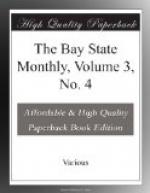At last General Scott began to wonder why he had received no further tidings from Major Anderson, and on the 27th of December he delivered the following message to the President:—
Since the formal order, unaccompanied by special instructions, assigning Major Anderson to the command of Fort Moultrie, no order, intimation, suggestion, or communication for his government and guidance, has gone to that officer, or any of his subordinates, from the head-quarters of the army; nor have any reports or communications been addressed to the General-in-chief from Fort Moultrie later than a letter written by Major Anderson, almost immediately after his arrival in Charleston harbor, reporting the then state of the work.
This letter reached the President on the 27th. On the day before Major Anderson had transferred his entire garrison from Fort Moultrie to Fort Sumter. It was a bold move, done without orders, and solely because there was no longer hope that the President would send reinforcements. It was a judicious move, because Sumter was the real key to Charleston harbor. It was an act of patriotism which will forever enshrine the name of Anderson in American history.
The tidings reached Washington. Disappointed and chagrined, Secretary Floyd sent the following telegram:—
WAR DEPARTMENT.
ADJUTANT-GENERAL’S OFFICE, December 27, 1880.
MAJOR ANDERSON, Fort Moultrie:—
Intelligence has reached here this morning that you have abandoned Fort Moultrie, spiked your guns, burned the carriages, and gone to Fort Sumter. It is not believed, because there is no order for any such movement. Explain the meaning of this report.
J.B. FLOYD,
Secretary of War.
The answer was as follows:—
CHARLESTON, December 27, 1860.
HON. J.B. FLOYD, Secretary of War:—
The telegram is correct. I abandoned Fort Moultrie because I was certain that, if attacked, my men must have been sacrificed, and the command of the harbor lost. I spiked the guns, and destroyed the carriages, to keep the guns from being used against us.
If attacked, the garrison would never have surrendered without a fight.
ROBERT ANDERSON,
Major First Artillery.
The event reached the President’s ears; he was perplexed, and postponed the promised interview with the Commissioners one day. He met them on the 28th. He states, in his Defence, published in 1866, that he informed them at once that he “could recognize them only as private gentlemen, and not as commissioners from a sovereign State; that it was to Congress, and to Congress alone, they must appeal.” Nevertheless, he expressed his willingness to communicate to that body, as the only competent tribunal, any proposition they might have to offer; as if he did not realize that this proposal was a quasi-recognition of South Carolina’s claim to independence, and a misdemeanor meriting impeachment.




